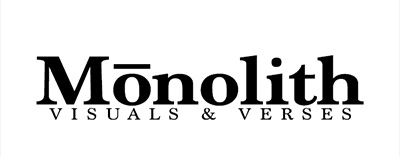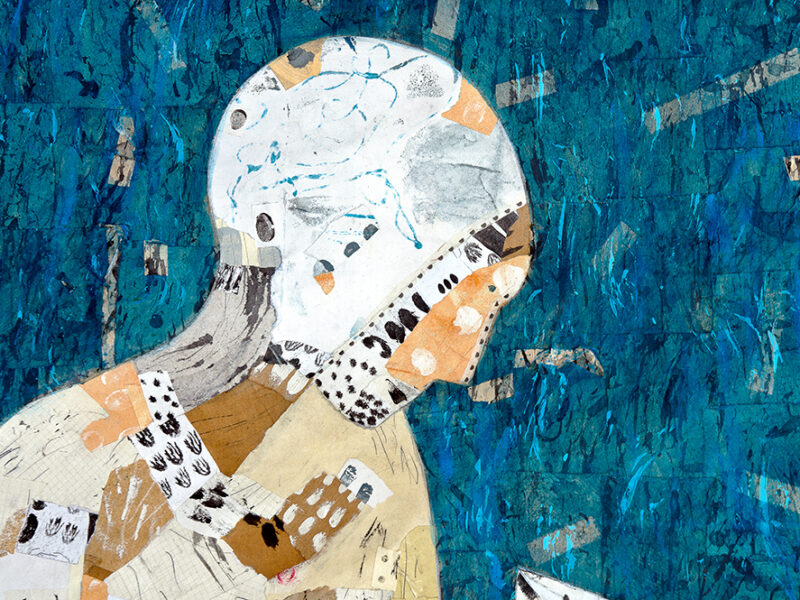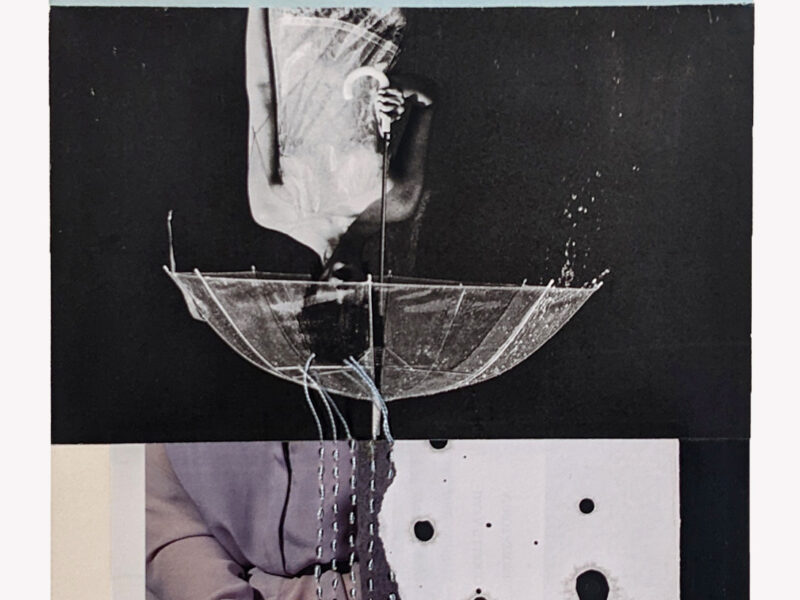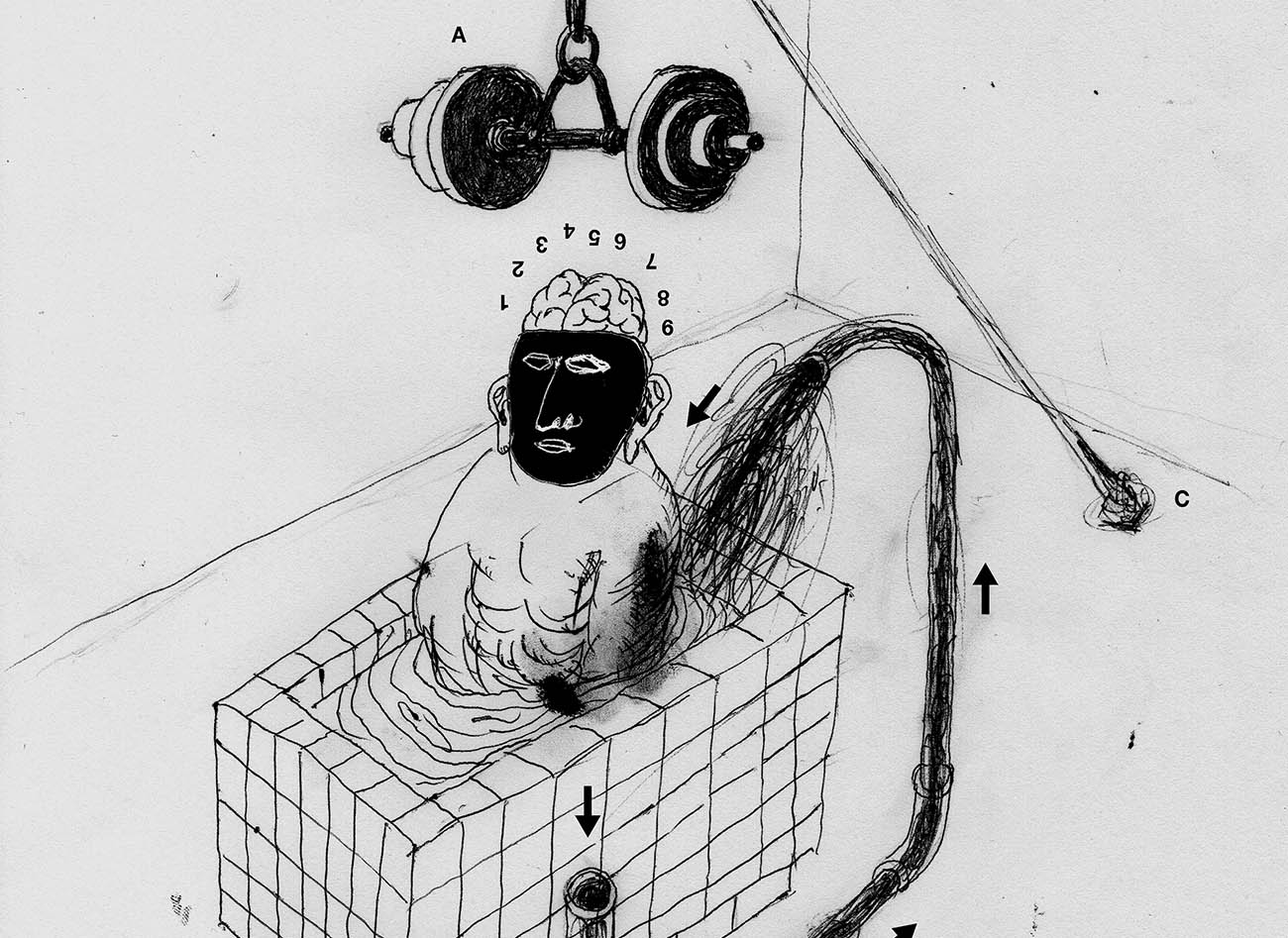
Gemma | Lo schema di Josef F.
The sign outside the clinic reads ANIMAL WELFARE LEAGUE W.O. 1529. Below is a line stating the daily hours, but this has been taped over. At the door is a line of waiting people, some with animals. As soon as he gets out of his car there are children all around him, begging for money or just staring. He makes his way through the crush, and through a sudden cacophony as two dogs, held back by their owners, snarl and snap at each other. The small, bare waiting-room is packed. He has to step over someone’s legs to get in. ‘Mrs Shaw?’ he inquires. An old woman nods toward a doorway closed off with a plastic curtain. The woman holds a goat on a short rope; it glares nervously, eyeing the dogs, its hooves clicking on the hard floor. In the inner room, which smells pungently of urine, Bev Shaw is working at a low steel-topped table. With a pencil-light she is peering down the throat of a young dog that looks like a cross between a ridgeback and a jackal. Kneeling on the table a barefoot child, evidently the owner, has the dog’s head clamped under his arm and is trying to hold its jaws open. A low, gurgling snarl comes from its throat; its powerful hindquarters strain. Awkwardly he joins in the tussle, pressing the dog’s hind legs together, forcing it to sit on its haunches. ‘Thank you,’ says Bev Shaw. Her face is flushed. ‘There’s an abscess here from an impacted tooth. We have no antibiotics, so -hold him still, boytjie! – so we’ll just have to lance it and hope for the best.’ She probes inside the mouth with a lancet. The dog gives a tremendous jerk, breaks free of him, almost breaks free of the boy. He grasps it as it scrabbles to get off the table; for a moment its eyes, full of rage and fear, glare into his. ‘On his side – so,’ says Bev Shaw. Making crooning noises, she expertly trips up the dog and turns it on its side. ‘The belt,’ she says. He passes a belt around its body and she buckles it. ‘So,’ says Bev Shaw. ‘Think comforting thoughts, think strong thoughts. They can smell what you are thinking.’ He leans his full weight on the dog. Gingerly, one hand wrapped in an old rag, the child prises open the jaws again. The dog’s eyes roll in terror. They can smell what you are thinking: what nonsense! ‘There, there!’ he murmurs. Bev Shaw probes again with the lancet. The dog gags, goes rigid, then relaxes. ‘So,’ she says, ‘now we must let nature take her course.’ She unbuckles the belt, speaks to the child in what sounds like very halting Xhosa. The dog, on its feet, cowers under the table. There is a spattering of blood and saliva on the surface; Bev wipes it off. The child coaxes the dog out.
‘Thank you, Mr Lurie. You have a good presence. I sense that you like animals.’ ‘Do I like animals? I eat them, so I suppose I must like them, some parts of them.’
Her hair is a mass of little curls. Does she make the curls herself, with tongs? Unlikely: it would take hours every day. They must grow that way. He has never seen such a tessitura from close by. The veins on her ears are visible as a filigree of red and purple. The veins of her nose too. And then a chin that comes straight out of her chest, like a pouter pigeon’s. As an ensemble, remarkably unattractive. She is pondering his words, whose tone she appears to have missed. ‘Yes, we eat up a lot of animals in this country,’ she says. ‘It doesn’t seem to do us much good. I’m not sure how we will justify it to them.’ Then: ‘Shall we start on the next one?’ Justify it? When? At the Great Reckoning? He would be curious to hear more, but this is not the time.
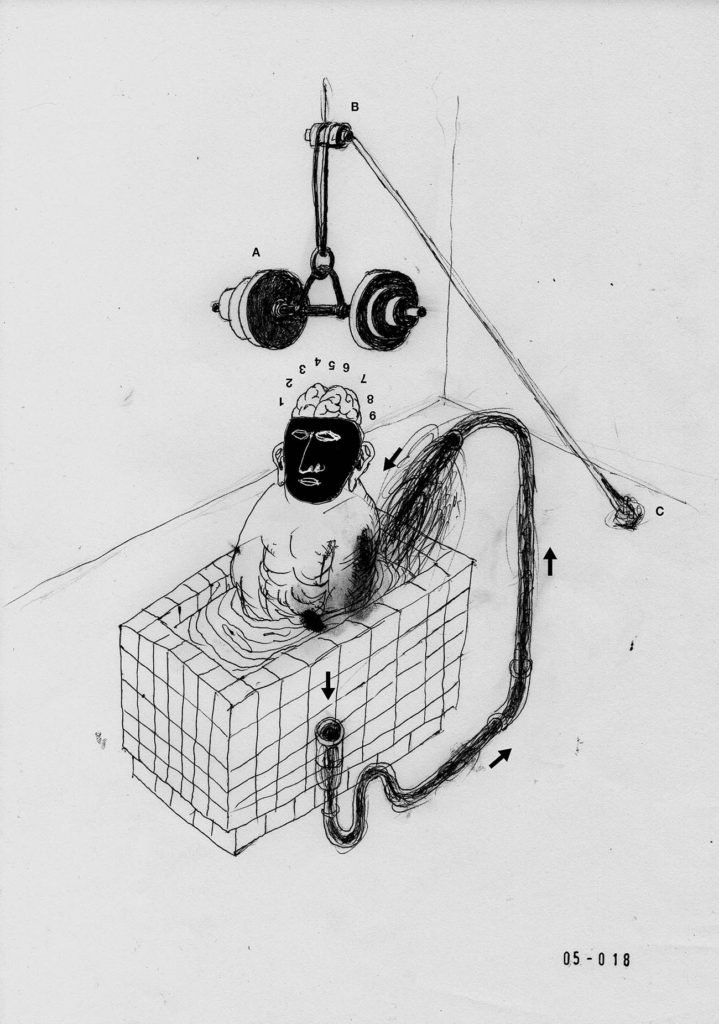
Camera delle vasche fredde, (o lo schema di Josef F.) | 2018 Da: Vettor Pisani, Maschile, femminile e androgino – Incesto e cannibalismo in Marchel Duchamp, 1970 | Penna biro e stampa digitale su carta, cm 29,7 x 21
The goat, a fullgrown buck, can barely walk. One half of his scrotum, yellow and purple, is swollen like a balloon; the other half is a mass of caked blood and dirt. He has been savaged by dogs, the old woman says. But he seems bright enough, cheery, combative. While Bev Shaw is examining him, he passes a short burst ofpellets on to the floor. Standing at his head, gripping his horns, the woman pretends to reprove him. Bev Shaw touches the scrotum with a swab. The goat kicks. Van you fasten his legs?’ she asks, and indicates how. He straps the right hind leg to the right foreleg. The goat tries to kick again, teeters. She swabs the wound gently. The goat trembles, gives a bleat: an ugly sound, low and hoarse. As the dirt comes away, he sees that the wound is alive with white grubs waving their blind heads in the air. He shudders. ‘Blowfly,’ says Bev Shaw. ‘At least a week old.’ She purses her lips. ‘You should have brought him in long ago,’ she says to the woman. ‘Yes,’ says the woman. ‘Every night the dogs come. It is too, too bad. Five hundred rand you pay for a man like him.’ Bev Shaw straightens up. ‘I don’t know what we can do. I don’t have the experience to try a removal. She can wait for Dr Oosthuizen on Thursday, but the old fellow will come out sterile anyway, and does she want that? And then there is the question of antibiotics. Is she prepared to spend money on antibiotics?’ She kneels down again beside the goat, nuzzles his throat, stroking the throat upward with her own hair. The goat trembles but is still. She motions to the woman to let go of the horns. The woman obeys. The goat does not stir. She is whispering. ‘What do you say, my friend?’ he hears her say. ‘What do you say? Is it enough?’ The goat stands stock still as if hypnotized. Bev Shaw continues to stroke him with her head. She seems to have lapsed into a trance of her own. She collects herself and gets to her feet. ‘I’m afraid it’s too late,’ she says to the woman. ‘I can’t make him better. You can wait for the doctor on Thursday, or you can leave him with me. I can give him a quiet end. He will let me do that for him. Shall I? Shall I keep him here?’ The woman wavers, then shakes her head. She begins to tug the goat toward the door.
‘You can have him back afterwards,’ says Bev Shaw. ‘I will help him through, that’s all.’ Though she tries to control her voice, he can hear the accents of defeat. The goat hears them too: he kicks against the strap, bucking and plunging, the obscene bulge quivering behind him. The woman drags the strap loose, casts it aside. Then they are gone.
‘What was that all about?’ he asks. Bev Shaw hides her face, blows her nose. It’s nothing. I keep enough lethal for bad cases, but we can’t force the owners. It’s their animal, they like to slaughter in their own way. What a pity! Such a good old fellow, so brave and straight and confident!’ Lethal: the name of a drug? He would not put it beyond the drug companies. Sudden darkness, from the waters of Lethe. ‘Perhaps he understands more than you guess,’ he says. To his own surprise, he is trying to comfort her. ‘Perhaps he has already been through it. Born with foreknowledge, so to speak. This is Africa, after all. There have been goats here since the beginning of time. They don’t have to be told what steel is for, and fire. They know how death comes to a goat. They are born prepared.’ ‘Do you think so?’ she says. ‘I’m not sure. I don’t think we are ready to die, any of us, not without being escorted.’
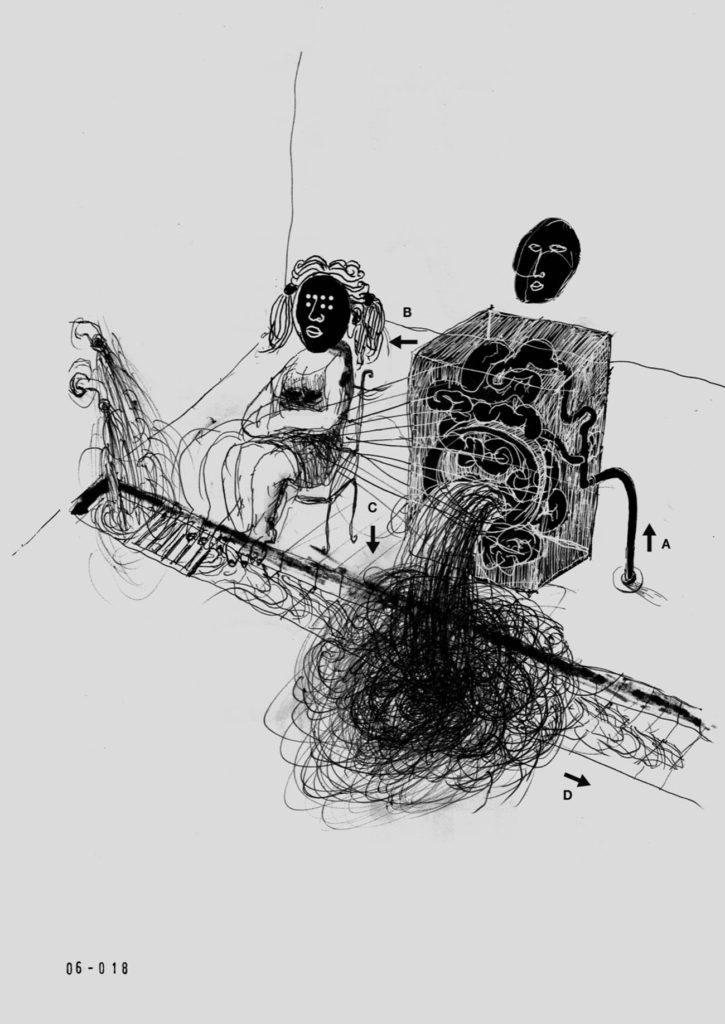
Lavatorium (o lo schema di Elisabeth F.) | 2018 | Penna biro, pennarello e stampa digitale su carta, cm 29,7 x 21
Things are beginning to fall into place. He has a first inkling of the task this ugly little woman has set herself This bleak building is a place not of healing – her doctoring is too amateurish for that – but of last resort. He recalls the story of- who was it? St Hubert? – who gave refuge to a deer that clattered into his chapel, panting and distraught, fleeing the huntsmen’s dogs. Bev Shaw, not a veterinarian but a priestess, full of New Age mumbo jumbo, trying, absurdly, to lighten the load of Africa’s suffering beasts. Lucy thought he would find her interesting. But Lucy is wrong. Interesting is not the word. He spends all afternoon in the surgery, helping as far as he is able. When the last of the day’s cases has been dealt with, Bev Shaw shows him around the yard. In the avian cage there is only one bird, a young fish-eagle with a splinted wing. For the rest there are dogs: not Lucy’s well-groomed thoroughbreds but a mob of scrawny mongrels filling two pens to bursting point, barking, yapping, whining, leaping with excitement. He helps her pour out dry food and fill the water-troughs. They empty two ten-kilogram bags. ‘How do you pay for this stuff?’ he asks. ‘We get it wholesale. We hold public collections. We get donations. We offer a free neutering service, and get a grant for that.’ ‘Who does the neutering? ‘Dr Oosthuizen, our vet. But he comes in only one afternoon a week.’ He is watching the dogs eat. It surprises him how little fighting there is. The small, the weak hold back, accepting their lot, waiting their turn.
‘The trouble is, there are just too many of them,’ says Bev Shaw. ‘They don’t understand it, of course, and we have no way of telling them. Too many by our standards, not by theirs. They would just multiply and multiply if they had their way, until they filled the earth. They don’t think it’s a bad thing to have lots of offspring. The more the jollier. Cats the same.’ ‘And rats.’ ‘And rats. Which reminds me: check yourself for fleas when you get home.’ One of the dogs, replete, eyes shining with wellbeing, sniffs his fingers through the mesh, licks them.
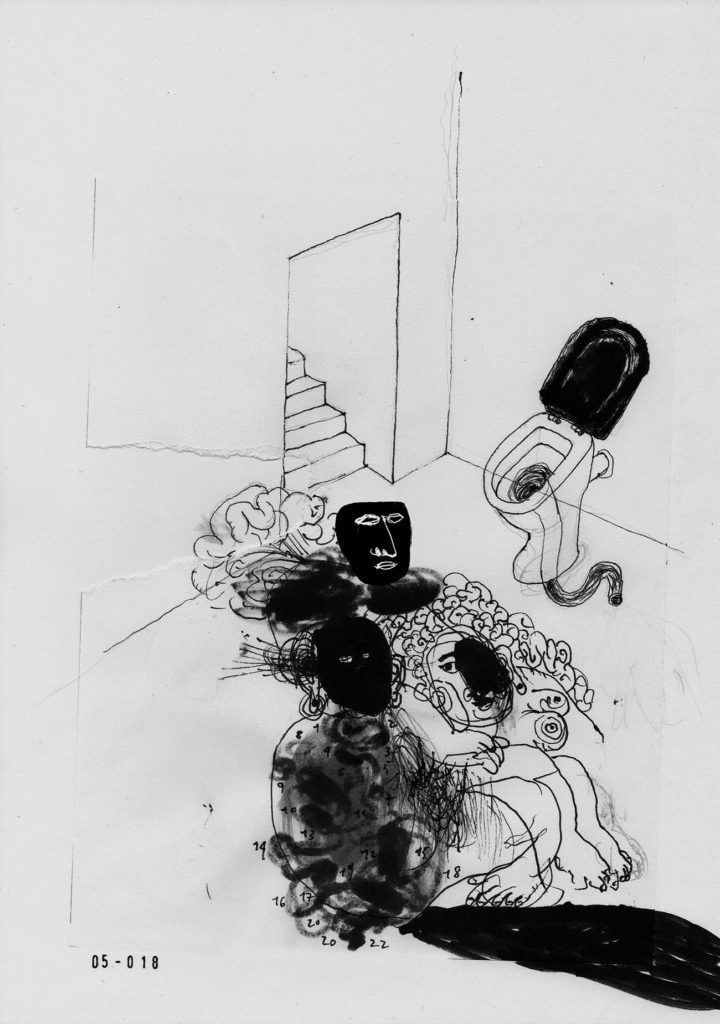
Shunga (o la sta stanza di Josef F.) | 2018 | Pennarello e stampa digitale su carta, cm 29,7 x 21
Excerpts by “Disgrace” | J.M. Coetzee | Secker & Warburg | 1999
